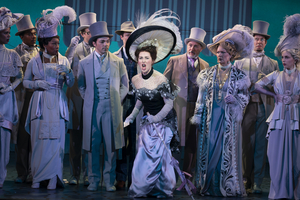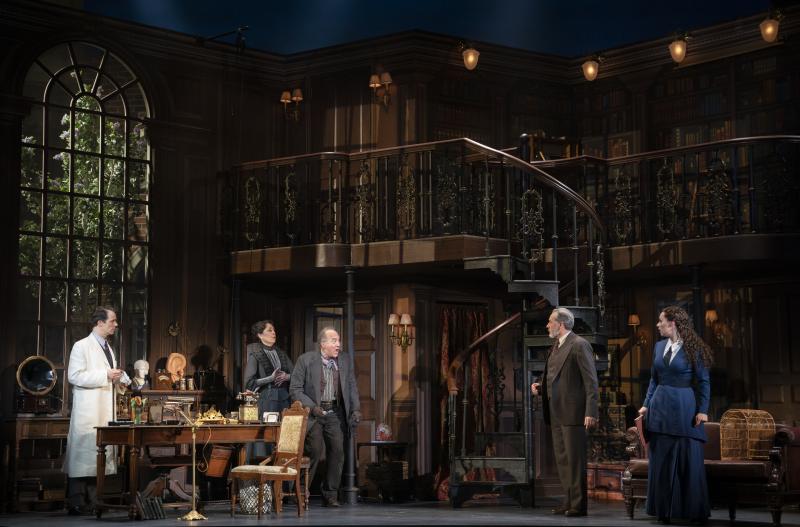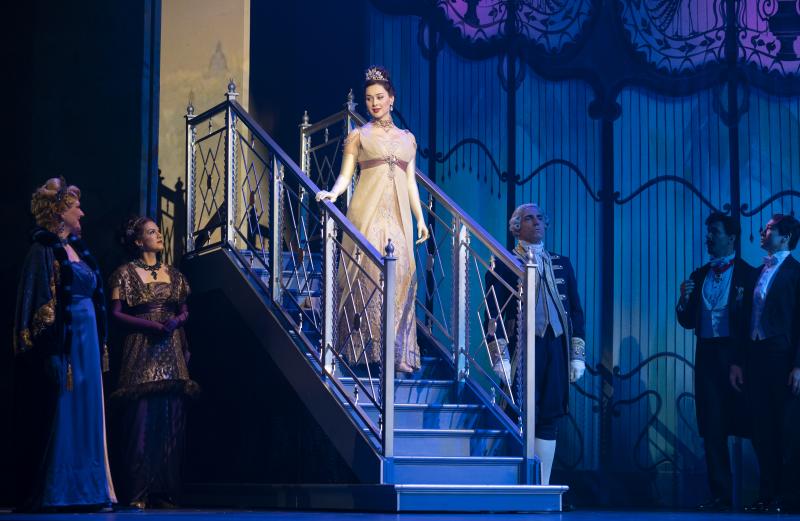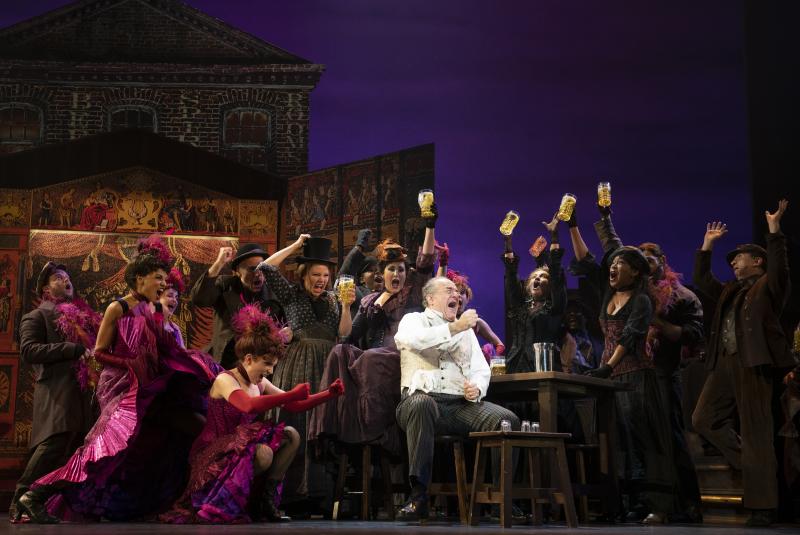Review: Sher Tinkers With MY FAIR LADY, Recalibrating Its Perfections
 Ah, perfection! It's what so many of us unthinkingly strive for. Yet achieving perfection, the pedestal Lerner & Loewe's MY FAIR LADY perches upon in the eyes of so many, invites a whole set of calamities, chiefly complacency and inertia. Worshipers at the altar of perfection would understandably strive to replicate the voice of Julie Andrews and the grace of Audrey Hepburn in presenting Eliza Doolittle - or the sublimely calibrated gruffness of Rex Harrison in reviving Professor Henry Higgins.
Ah, perfection! It's what so many of us unthinkingly strive for. Yet achieving perfection, the pedestal Lerner & Loewe's MY FAIR LADY perches upon in the eyes of so many, invites a whole set of calamities, chiefly complacency and inertia. Worshipers at the altar of perfection would understandably strive to replicate the voice of Julie Andrews and the grace of Audrey Hepburn in presenting Eliza Doolittle - or the sublimely calibrated gruffness of Rex Harrison in reviving Professor Henry Higgins.
Their perfection has seemed to add layers of tamper-proof portrayals to Frederick Loewe's cavalcade of memorable melodies, Alan Jay Lerner's concise and pungent lyrics, and the duo's deft adaptation of George Bernard Shaw's Pygmalion. Over the decades since it premiered on Broadway in 1959, our concepts of the ideal Fair Lady have become the sound of the original cast album (a #1 best seller) and the lavish look of the Hollywood film (Oscar for Best Picture).
But what about the stage show? There we tend to be rather vague. If you've been following theatre in Charlotte for the past 30 years or so, seeing as many as half-a-dozen local revivals as I have, you dimly remember one or two of them. Last national FAIR LADY tour to stop in Charlotte? Never happened before the current tour now playing at Ovens Auditorium.
Launched this past December, five months after it closed on Broadway, the acclaimed Lincoln Center Theater production directed by Bartlett Sher dares to mess with the perfect musical. You'll most readily notice Sher's ministrations in the final scene, where Eliza's response to Higgins' peremptory "Fetch me my slippers!" seems to draw a "did-that-really-happen?" reaction from the Professor. But Sher also makes a sumptuous meal of "The Servant's Chorus," a song that I could not remember hearing live before, an 84-second relic from the film soundtrack that was apparently shoehorned into the 1993 revival.
The insertion of this interlude, between "Just You Wait" - with its gawky vowels and dropped aitches - and Liza's breakthrough "Rain in Spain," makes delicious dramatic sense, giving us some idea of the flower girl's arduous toil to master proper English pronunciation and Higgins' merciless prodding. A gaggle of servants scurries through a mammoth two-story house that Sher has tasked set designer Michael Yeargen to build in such grand fashion that it revolves, showing us three different rooms in Higgins' home.

Extending Liza's struggles into epic spectacle makes her sudden latenight "Rain in Spain" triumph that much more rewarding. The crowning point of the sequence, Liza's exuberant "I Could Have Danced All Night" after Higgins and servants have wearily trudged off to sleep, had never moved me so much before, a true revelation.
But improving on perfection ran into technical difficulties on opening night. To clear the upstage wall for its subsequent rotations - and likely to ensure its stability - the two-story set must come forward a few feet toward the audience before it's properly secured and ready to roll. Instead, there was a slight lurch before the mighty edifice stalled. True to the hallowed show-must-go-on spirit, Laird Mackintosh as Higgins launched into the scene with one of his butlers, only to be shut down by the crew. Houselights came up as the curtain came down, and we heard the dreaded announcement on the PA, which confirmed a problem rather than describing it.
The third stop on the new MY FAIR LADY tour had come to a dead stop. After a half-hour delay, I felt thankful that the snafu had occurred at the top of the scene so that the whole revelatory sequence was eventually delivered without interruption. Mackintosh as Professor Higgins and Shereen Ahmed as Eliza make a wonderful pair. Ahmed doesn't have the #MeToo energy and cleverness attributed to Lauren Ambrose when she brought this production to Lincoln Center in 2018. She almost doesn't need to with all the abrasiveness, conceit, and disregard that Mackintosh brings to Higgins' misogynistic treatment of Eliza.
We feel like Eliza is being abused long before the Professor's aborted physical attack on her, and Mackintosh never surrenders all the cruel edge of Lerner's lyrics in "I'm an Ordinary Man" and "A Hymn to Him" to their comedy. Nor is there more potent testimony to Eliza's triumph than Mackintosh's chastened, broken rendition of "I've Grown Accustomed to Her Face." Sher manages to remind us in his nuanced staging that women are still mobilizing behind the cause of suffrage at the time the action is set in 1912. We can cut some slack, then, if Ahmed seems a little deferential towards Higgins' erudition, wealth, and gender - and, in turn, we can cut Mackintosh some slack for his troglodyte arrogance.
Sher also judges keenly in giving us a more youthful Higgins, for Mackintosh can react to Ahmed emotionally as she wins his admiration, almost sweeping away thoughts of her desirability as a maidservant or private secretary. That youthful casting gives Ahmed more to be giddy about when Higgins shows her his first glimmer of approval and pride. In "I Could Have Danced All Night," Ahmed's whole body seems to awaken to undreamed-of possibilities that surpass the prospect of becoming a private secretary or a flower shop owner.

Ahmed does sing superbly, showing steel and vitality in her bellicose songs, "Just You Wait," "Show Me," and "Without You." Helped along by Catherine Zuber's smashing costumes, Ahmed also transforms magnificently from the grubby Cockney we meet in the opening scene into a vision of regal elegance that credibly explodes Higgins' wildest expectations of success for his phonetic experimentations - and his gentlemen's bet with Colonel Pickering.
Pickering and Higgins' patrician mom, whom you might expect to oppose Eliza, turn out to be her staunchest supporters. Sher doesn't tamper with their traditional essences, bespeaking the good-heartedness of upper-crust Brits, getting zesty and stylish performances from Leslie Alexander as Mrs. Higgins and Kevin Pariseau as the Colonel.
Yet when it comes to the young gentleman smitten by Eliza, Freddy Eynsford-Hill, Sher calls upon Sam Simahk to augment the chap's dopiness and devotion. That allows for a broader comical take on Eliza's gaucheries at the Ascot races in her society debut. And it equips Liza with a lovestruck, puppy dog valet throughout most of Act 2, reaffirming her new sheen. Simahk only slightly trims back the rhapsodic splendor of "On the Street Where You Live" in pulling off this alteration.
Drunken, vulgar, and rascally, Adam Grupper as the irrepressible Alfred P. Doolittle now seems heaven-sent, purposed to make Higgins seem enlightened and evolved by comparison. Holding his hat respectfully in Higgins' study as he sells his daughter's virtue for five pounds sterling, or dancing the night away with barroom sluts the night before his wedding, Grupper is a quintessential scoundrel, lit up with earthy, peasant merriment. His "Get Me to the Church on Time" production number is even more extravagant than the pivotal "Servant's Chorus," with climactic funeral imagery in Christopher Gattelli's choreography on loan from the Scrooge movie musical.

As Higgins proceeded afterwards to toy with thoughts of reconciliation and matrimony, I could see more clearly than ever before that he and Doolittle are kindred spirits. I could also appreciate more keenly the delicious irony that Higgins' benevolent sponsorship of Doolittle's welfare, which has a sequel beyond that five-pound note, is what lands Alfred P. in his matrimonial pickle.
But if you don't like the ambiguous ending of MY FAIR LADY, you can take comfort in the fact that George Bernard Shaw didn't write it. Unlike the 1938 screen version, the true source of Lerner's adaptation, the GBS play ends with Higgins exclaiming, "Marry Freddy, ha!" A 14-page postscript incorporates Shaw's prognostications about his vibrant protagonists' futures.
Photo Credit: Joan Marcus
Reader Reviews

Videos

